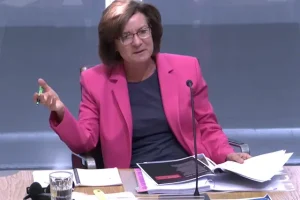THE WELSH Government issued a disgraceful response to an inquiry on public appointments, showing disrespect bordering on contempt for the Senedd, a watchdog committee warned.
Senedd Members on the public accounts committee were outraged by ministers’ response to their report which found evidence of significant failings in public sector appointments.
The Welsh Government failed to clearly accept nor reject any of the committee’s 20 recommendations, providing a “waffling” 35-page response instead.
During this Senedd term, scrutiny committees have lamented ministers for increasingly accepting recommendations “in principle”, with a narrative below in contradiction.
The Welsh Government promised to end this practice seven years ago but – in the latest inquiry response –,ministers stooped to a new low, according to Senedd Members.
Mark Isherwood, who chairs the public accounts committee, said: “It is deeply regrettable that the Welsh Government has failed to indicate in their response whether recommendations have been accepted, rejected or even accepted in principle or in part.”
He warned: “This further step to not respond in line with existing convention inhibits this committee’s ability to scrutinise implementation, and it’s therefore of serious concern.”
During a meeting on June 18, Mr Isherwood stressed that the recommendations were made with genuine intentions to make improvements following in-depth evidence sessions.

He said: “Whilst we accept not all recommendations will be accepted – they rarely are – this is a troubling development, and we will be pursuing this further… as a matter of priority.
“In instances where recommendations are rejected, we would expect, in the interest of accountability, for this rejection to be clearly flagged in the Welsh Government’s response, and a full explanation of the reasons for rejection to be provided.”
Plaid Cymru’s Adam Price echoed his concerns: “I think this response is disgraceful, to tell you the truth. You’re entirely right to challenge them, chair, on the waffle… we’ve had in response, which is not clear at all, I’d say, [on] where policy and action stands.”
He drew the committee’s attention to the response to recommendation 10, “which says that the recommendation is beyond the scope of the inquiry”.
Mr Price said: “Well, it’s not the responsibility or the role of the government to tell us as a committee of the Senedd what is within the scope of our own inquiries….
“Recommendation 11, then, says that it’s not possible for them to generate data they had committed to gathering and publishing five years ago, according to their strategy.”

“So, I think that this response represents a very low point, or the lowest point I’ve seen, in truth, in response to a report that pointed out, as you said, following detailed evidence, deficiencies of the implementation of Welsh Government policy.

“I do think we have to challenge this, not only in the context of this inquiry, but as a matter of principle for all of our Senedd committees.”
Mr Isherwood agreed: “It’s disrespectful to this committee and the parliament. It’s almost contemptuous of parliament and the role parliament plays in a representative democracy.”
Senedd Members will debate the report further on June 25.














